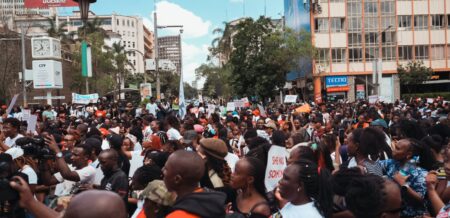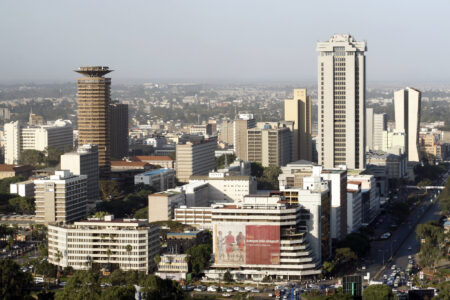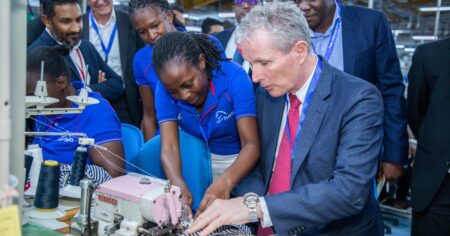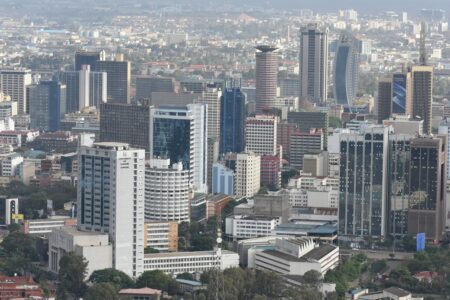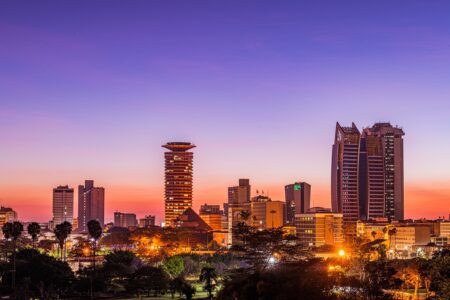- Africa’s new dawn: the rising role of digital and AI in agriculture
- Can Dangote Refinery Transform Africa Energy Ambition
- Gallup Survey: 80 per cent of Kenyan Workers Are Disengaged and Seek New Opportunities
- Madagascar Man Freed from 5KG Tumor After 15-Year Struggle
- How women in Africa are perceived and treated
- Sugar consumption in Kenya to Increase to 1.23 Million Tonnes
- Can Somalia and Turkey Oil deal Bring Change in Somaliland
- Remittances to Kenya dropped to $371.6 million in June, marking a six month low
Browsing: S&P Global
- Business confidence slips to lowest since February
- Input prices rise mildly after back-to-back declines
- Steepest drops in activity and new work for seven months
Kenya’s business activity dips amid tax revolt
Kenya’s business activities fell sharply in June amid reports of widespread economic challenges and a negative impact on sales from protests and policy uncertainty, the Standard Bank’s Purchasing Managers’ Index (PMI) for June indicates. New business intakes dropped at the fastest rate since November last year, leading to a drop in business confidence and weaker job creation.
Although Kenyan firms also saw a renewed increase in their input costs in June, the rate of inflation was mild and had little impact on selling charges.
The survey by Stanbic Bank Kenya, compiled by S&P Global was conducted between June12 and June 26, with headline figure derived from the survey reading at 47.2 in June. Readings above 50.0 signal an improvement …
- Kenya’s business conditions weakened slightly in March despite easing inflation.
- Kenyan firms reduced their purchases of inputs in line with weaker sales.
- Most businesses remain optimistic about their workforce size and revenue growth in the year’s second quarter (April-June).
The latest Stanbic Bank Kenya Purchasing Managers’ Index indicates that Kenya’s business conditions weakened slightly in March despite easing inflation.
The deterioration in operating conditions was witnessed across the private sector as order book volumes and output levels contracted. The downturn contrasted with February, which saw an improvement in the private sector for the first time in six months.
Despite the decline, the survey data provided some positive signals for Kenyan businesses. Staffing and inventories showed further growth, indicating potential expansion opportunities.
Additionally, input cost inflation slowed to its lowest level in over three years amid a recovery in the shilling against the US dollar and other major currencies, including those …
- Remittance inflows amounted to $385.9 million in February, compared to $309.2 million in February 2023, an increase of 24.8 per cent.
- The cumulative inflows for the 12 months to February 2024 totaled $4.33 billion compared to $4.03 billion in a similar period in 2023, an increase of 7.5 per cent.
- The US remained the largest source of remittances to Kenya, accounting for 54 per cent in February 2024.
Remittances to Kenya continued on a growth trajectory in February, latest Central Bank of Kenya (CBK) data shows, as easing inflation in the United States saw the country maintain its position as the leading source of inflows.
This comes amid a positive projection for the year where World Bank has forecast a 2.5 per cent increase on inflows to Sub-Saharan Africa, with Nigeria, Ghana and Kenya as leading recipients in the continent.
Remittance inflows in Kenya amounted to $385.9 million in February, …
- Kenya’s input prices and output charges rise at much softer rates.
- New orders decrease slightly, survey shows.
- Declines in output and employment ease.
Kenya’s private sector business conditions showed a strong move towards stability in December 2023, as revealed by the latest Purchasing Managers’ Index findings, even though businesses remained less optimistic about the future into 2024.
According to the Stanbic Bank Kenya PMI compiled by S&P Global, rises in input costs and output prices were the softest since April of the previous year, having slowed markedly from record highs in October.
Kenya’s private sector experiences uptick in client spending
Consequently, many companies experienced a recovery in new work amid improved client spending, offsetting the impact of cost-of-living pressures. As a result, new orders, output, and employment all declined to lesser degrees.
The headline figure derived from the survey is the PMI. Readings above 50.0 signal an improvement in …
Business conditions in Kenya remained in a steep decline halfway through the final quarter of the year, according to the latest Purchasing Managers’ Index (PMI) by S&P Global.
This comes amid sizeable falls in output, new orders, and employment in November, as indicated by the PMI, which closely monitors market-moving economic indicators, covering more than 30 advanced and emerging economies worldwide.…
- Output and new orders increase slightly.
- Employment growth quickens amid improved outlook.
- Inflationary pressures remain at historic highs.
Business conditions in Kenya improved for the first time since January, the latest Purchasing Managers’ Index (PMI) indicates. August Stanbic Bank Kenya PMI pointed to a slight improvement in the health of the private sector for the first time in seven months, as output and new orders returned to expansion territory amid greater political stability.
Job creation accelerated and purchasing activity picked up, whilst firms grew more confident about their output prospects. That said, the improvement in business conditions was only mild, and continued to be weighed down by elevated price pressures.
Indeed, input prices continued to rise at an historically strong pace, leading to the fastest increase in selling charges since June 2022.
PMI readings above 50.0 signal an improvement in business conditions on the previous month, while readings below 50.0 …
- In Kenya, political protests accelerated the downturn, leading to a sharp dip in output that was the fastest since August last year.
- Forex woes and reports of rising fuel prices and taxes equally pushed up business costs in July.
- In Uganda, data shows output and new orders are edging up steadily on a monthly basis in the past one year.
Kenya’s private sector activity suffered a further drop in demand at the start of the third quarter of the year, latest statistics show, as customers continued to limit spending amid steep inflation. Kenya’s poor data came even as neighbouring Uganda recorded improvements in the health of the its private sector activity. Uganda is experiencing a stronger demand environment despite facing challenges in the macro environment.
In Kenya, political protests accelerated the downturn, according to surveyed firms. This resulted in a sharp contraction in output that was the fastest since August …
- High inflation due to rising fuel and food costs hurt business confidence in April.
- Stanbic Bank’s Purchasing Manager Index (PMI) shows output and new orders declined sharply.
- Downturn was led by manufacturing and services, contrasting with expansions in agriculture, construction, wholesale and retail.
Kenya’s business confidence dipped to the lowest levels on record in April, the latest PMI survey shows. During the period, high inflation and political unrest led to a sharp fall in customer demand ruffling business confidence.
Activity levels and input purchases also fell sharply, but employment numbers continued to rise, the Purchasing Managers’ Index indicates. On a positive note, input cost pressures showed further signs of having peaked, dropping to their lowest recorded in 2023 so far, though remaining steep.
The headline figure derived from the survey by Stanbic Bank Kenya is the PMI. Readings above 50 signal an improvement in business conditions on the previous month, …





